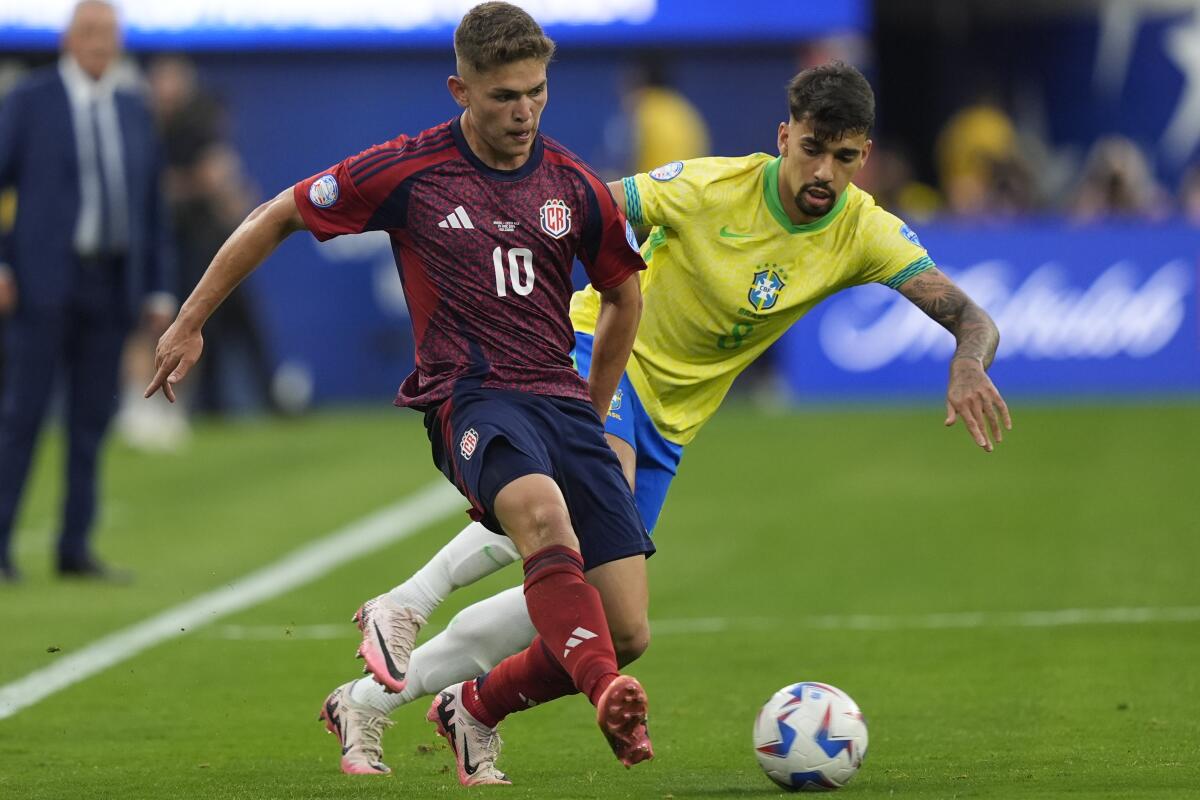Omar Duran had never been to SoFi Stadium until Monday. So consider his visit for the Copa América group-stage game between Brazil and Costa Rica something of a trial run for the 2026 World Cup, now less than two years away.
“It’s beautiful,” Duran said, gripping a beer in his left hand as he made his away along the stadium’s spacious concourse. “It’s amazing what they have done.”
The game, which ended in a scoreless draw, was something of a practice run for the stadium too. The first in a series of test runs, actually, since SoFi will play host to another Copa América game Wednesday, when Mexico faces Venezuela. Then in late July, English Premier League giants Arsenal and Manchester United will meet there in a friendly.
And for Otto Benedict, the stadium’s senior vice president for facility and campus operations, nothing will be too small to overlook given the task ahead. In 2026, SoFi will stage eight World Cup matches, including the U.S. team’s opener, the first men’s World Cup match to be played on American soil in 32 years. Only AT&T Stadium in Arlington, Texas, with nine games, will play host to more.
“The things that people probably don’t think about,” Benedict said when asked what he was focused Monday. “It’s a weekday. Our next game is a Wednesday. When we have World Cup games, we’re going to have weekday games.
“How much traffic we see on the streets right now, we want to know that because that’s going to impact how we’re preparing. So every little detail is something that we’re looking at to understand how that works.”
The bigger things will be dictated by FIFA, global soccer’s ruling body and the organizer of the World Cup. FIFA prohibits artificial turf in major tournaments, for example, so SoFi’s Matrix Turf field was covered with a temporary carpet of desert-grown natural grass from West Coast Turf for this week’s two Copa América games. For the World Cup, the field will be raised a couple of feet and another type of grass installed.
“This is a warm-season grass,” Benedict said. “The FIFA research team thinks this will be a cool-season-grass building. So they’re doing a lot of independent testing. But for us, it’s just good to see how much how much moisture’s getting in the air. How is it reacting?
“It’s all good learning and points that we’re going to take and share that with people and say, ‘Hey, here’s what we got out of this event.’”
SoFi’s floor is also too narrow to accommodate a regulation-size soccer field, which must be at least 74 yards wide along the goal line. That will be remedied for 2026 by eliminating field-level suites in the four corners and widening the playing surface, although that was not done for Copa América.
SoFi’s capacity of 70,240 is also small by FIFA standards but that can be boosted by as much as 10,000 with the addition of temporary stands in the upper deck above the north and south ends.
SoFi isn’t the only World Cup venue having a Copa dress rehearsal this summer. Eight of the 11 U.S. stadiums that will be used in 2026 are also staging Copa matches, and eight games into the tournament, some have been found wanting. Many stadiums will have to widen their pitches in the corners and add grass fields over the regular artificial turf.
That hasn’t gone well.
Players from both teams complained about the carpet laid down in Atlanta’s Mercedes-Benz Stadium for last week’s tournament opener, with Argentina goalkeeper Emiliano Martínez calling it a “disaster” and Canada defender Kamal Miller saying the field felt “as if it was hollow.”
U.S. midfielder Weston McKennie complained about a lack of atmosphere ahead of his team’s opening win over Bolivia, which was played in front of more than 30,000 empty seats at AT&T Stadium outside Dallas. Of the tournament’s first eight games, only Argentina’s opener sold out.
Monday’s SoFi match came close, with attendance announced at 67,158. And while the ersatz field and narrow dimensions drew complaints, the reviews from those who took part were mostly good.
“There are things that are going to have to improve obviously. The dimensions, the speed of the ball, that type of thing,” Costa Rica coach Gustavo Alfaro said in Spanish. “But it seems to me that it is a good test, to know what we need.
“The atmosphere was very nice. The logistics are very good. Everything was very easy for the teams. They did it very well.”
Teenage forward Andy Rojas agreed.
“The stadium is spectacular,” he said. “It’s a huge, beautiful stadium and it is good for hosting the World Cup. The grass felt like it slowed the ball a lot, but it can be fixed.”

Costa Rica’s Brandon Aguilera, left, and Brazil’s Lucas Paqueta battle for the ball during a scoreless draw at SoFi Stadium on Monday.
(Ryan Sun / Associated Press)
There were a few other glitches — a press elevator never showed up postgame — but nothing that negatively impacted the fan experience.
“It went well,” a SoFi official declared afterward. “A lot of the little nuance things that will be required as part of this major event, we’re going to be looking at those things,” Benedict added. “Whether it’s Copa, our upcoming concerts, even the NFL season in ‘24, in ‘25. We will take those learnings and make sure we’re adjusting.”
Yet for David Cartagena of Irvine, who attended the game with his son dressed in matching Real Madrid jerseys, Monday’s test was one the stadium passed with flying colors.
“For soccer and the World Cup? Are you kidding me?” he said as he waited in a quick-moving concession line. “This place is going to be crazy.”


